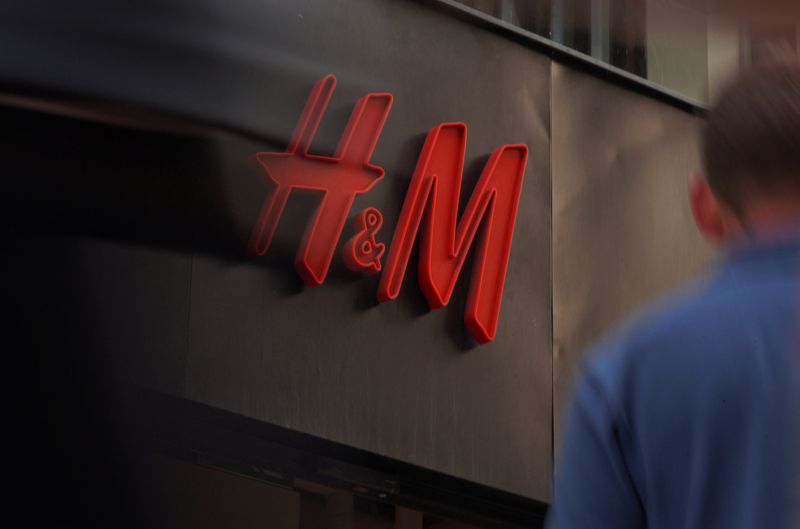By Helen Reid
LONDON (Reuters) -H&M is investigating 20 alleged instances of labour abuse at Myanmar garment factories that supply the world's second-largest fashion retailer, it told Reuters, just weeks after top rival Zara-owner Inditex (BME:ITX) said it was phasing out purchases from the Southeast Asian country.
A British-based human rights advocacy group tracked 156 cases of alleged worker abuse in Myanmar garment factories from February 2022 to February 2023, up from 56 in the previous year, indicating a deterioration of workers' rights since a military coup in February 2021.
Wage reduction and wage theft were the most frequently reported allegations, followed by unfair dismissal, inhumane work rates, and forced overtime, according to a report by the non-governmental organisation, the Business and Human Rights Resource Centre (BHRRC).
"All the cases raised in the report by BHRRC are being followed up and where needed remediated through our local team on the ground and in close cooperation with relevant stakeholders," H&M said in a statement.
"We are deeply concerned by the latest developments in Myanmar, and we see increased challenges to conduct our operations according to our standards and requirements," the Swedish retailer said.
The BHRRC has tracked allegations of workers' rights abuses in Myanmar garment factories since the military junta took power, plunging the country into political and humanitarian crisis. The tracker includes abuse cases at 124 separate factories.
The BHRRC said it tracks cases of alleged abuses through sources including union leaders, international media, and local media such as Myanmar Labour News, and seeks to verify reports by checking with brands and interviewing workers. Reuters has not independently verified its findings.
There have been 21 cases of alleged abuses linked to Inditex suppliers over the two-year period, and 20 linked to H&M suppliers, according to the report. Inditex declined to comment on the report.
A spokesperson for Myanmar's military government did not reply to a request for comment on the findings. The Myanmar Garment Manufacturing Association did not reply to a request for comment.
MADE IN MYANMAR
The decision by Inditex to cut ties with Myanmar suppliers came after Primark and Marks & Spencer (OTC:MAKSY) announced plans to exit last year, in a trend that some say could ultimately leave garment workers worse off.
Spanish fashion retailer Tendam also plans to stop sourcing from Myanmar, it said in its response to a BHRRC survey of brands published alongside the report.
"We do have a plan to leave the country but (it) has not been announced yet," Tendam wrote, without detailing its reasons. Tendam did not immediately reply to a request for comment.
Primark told Reuters it expects its final orders from Myanmar suppliers to ship before the end of this year, but has also increased its presence on the ground.
"As we work towards our exit, we've doubled the size of our Ethical Trade team on the ground, enabling us to more regularly visit the factories we still work with and giving us greater visibility," Primark said in an email on Wednesday.
Some brands continuing to source from Myanmar have also ramped up monitoring of suppliers.
Danish fashion company Bestseller increased its number of staff in its Myanmar office from three to 11 since the coup, it said in its survey response.
H&M, Bestseller, and Tendam are among 18 brands forming part of the European Union-funded MADE project aimed at improving labour conditions in Myanmar's garment factories.
The EU's stance is that companies should continue sourcing from Myanmar, where the garment industry is a key employer, with more than 500 factories producing clothes and shoes for big brands.
"By engaging as a company in discussions with local labour rights groups and trade unions on wages and labour conditions you can have leverage," said Karina Ufert, CEO at the European Chamber of Commerce in Myanmar. "By leaving the country, it is difficult to see how you can have an influence on local conditions."
Vicky Bowman, former British ambassador to Myanmar and director of the Myanmar Centre for Responsible Business, said the international brands under pressure to stop buying from Myanmar were also the most likely to provide stable jobs and take additional steps to guard against rights abuses.
"If they leave, either the jobs disappear entirely, or factories scrabble to receive orders from footloose buying agents who care only about cheap labour and do not worry about factory conditions," Bowman told Reuters.
In the BHRRC survey, some of the world's biggest apparel brands detailed their approach to the dilemma.
In its response, sportswear giant Adidas (OTC:ADDYY) wrote: "Despite the human rights and labor rights risks which have been identified, we believe that through enhanced human rights due diligence measures, we can continue to do business in Myanmar in a responsible manner and in alignment with core ILO (International Labour Organization) conventions, the UN Guiding Principles, and the OECD Guidelines."
Britain's Next wrote that it had considered withdrawing from Myanmar, but "whilst it can send a clear signal to the local government that its policies and practices are unacceptable, it can do huge damage to local communities and workers, depriving them of desperately needed investment and wages."
